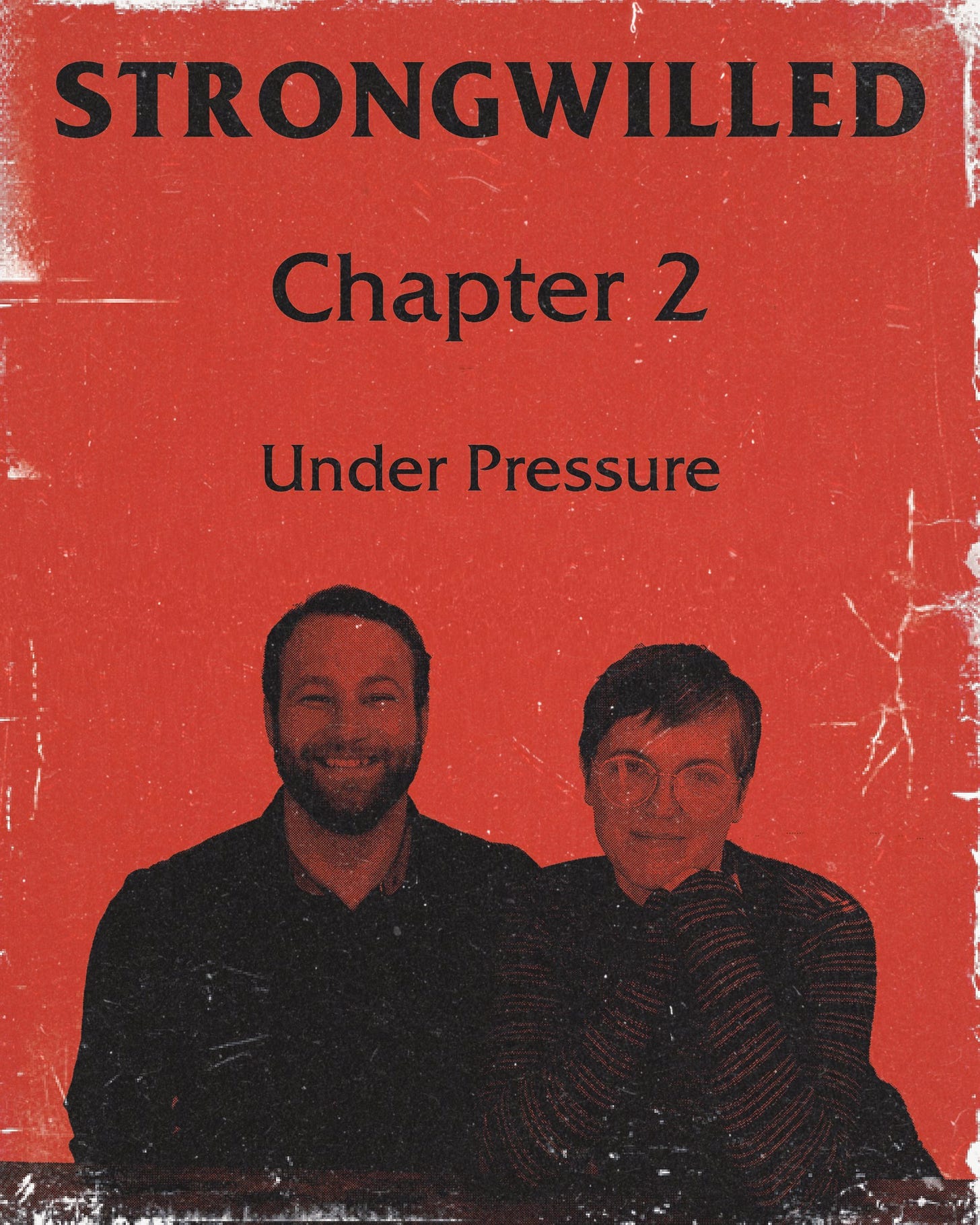Chapter 2: Under Pressure
What is it like to be child in a Religious Authoritarian home?
We are so grateful for the 800+ people that have already signed up for this project! Thank you so much for your interest and support.
What does it look like if you grow up in a family that uses Religious Authoritarian Parenting (RAP) principles? Today Krispin shares a bit of his personal story to highlight what a child experiences in these contexts. For more information on what RAP is, please see Chapter 1.
Chapter 2: Under Pressure
“There have to be sufficient spiritual resources in Jesus Christ to enable parents and children to succeed in this day—or else Christianity is a hoax,1” wrote J. Allan Peterson, founder and president of Family Crusades, and a friend of Billy Graham in 1971.2
For decades now, conservative leaders have positioned Christian families as lights in a world of chaos and dysfunction. Obedient and compliant children were key to this endeavor, as were strict parenting methods that employed coercive control and corporal punishment. Evangelical families—both the parents and the children—were expected to not only perform their rigid roles perfectly, but they also needed to do so with a smile on their face.
In an increasingly pluralistic society, simply using harsh, exacting punishments alone wouldn’t work any longer. The leaders of the RAP movement knew that these methods only led to outright rebellion in children and led to condemnation from outside sources. They needed an image management strategy, and they needed everyone to buy into it. Although control was the bedrock of the hierarchical and authoritarian evangelical family system, their ideology depended on a picture-perfect image of a loving family. They needed to uphold the narrative that the Christian way of parenting produced happy, calm, emotionally close families. Good families. Transformed families.
The whole world was watching, after all.
I grew up on a steady diet of Christian media, because my parents, like most white evangelical parents, were very cautious about what kind of messages I was exposed to in music, movies and books. We had Amy Grant in the tape deck in our 1979 ford station wagon, Veggie Tales on VHS, and Adventures in Odyssey on the radio. In a culture war over society’s values, where progressives were trying to depart from traditional roles and hierarchies, it was important to evangelicals to insulate their kids with Christian messages that would form their view of the world into a conservative ideology.
I have a distinct memory of some of the first Christian music I heard. It was a cassette tape by Steve Green that I listened to at bedtime, a collection of Bible verses put to song. The songs would nudge slightly into my consciousness, as I let the day slip away. One song from that kids tape became the anthem of my childhood: “Do everything without complaining, without arguing, so that you may become blameless and pure children of God.” In cheery kid-music tones, it reminded kids that to be a child of God, you’re required to do everything without complaining and arguing. Before the singing starts on the track, Steve Green breaks in, talking explicitly how this is a “real challenge” because it means you have to do all things, every time, with a good attitude to be a child of God.
Steve Green Without Complaining Philippians 2:14
My mom would often sing the song to us four kids, especially when we were feeling grumpy about chores or something we’d been asked to do. It was the truest thing I knew about being a good Christian kid: you had to obey without complaining or arguing, every single time.
It was incredibly important to my parents that home life ran smoothly, which depended primarily on us kids doing as we were told and being always ready to obey. Regular chores weren’t a big deal, but if we were in the middle of playing, it felt jarring for me to be asked to gather dirty clothes from the hamper, or clean up toys left out, knowing that if I didn’t respond immediately and with a smile on my face, there’d be at least scolding and shaming, with the looming threat of a spanking.3 When I was at home, a part of me had to be hypervigilant, ready to submit, to show that I was a good kid—that I was a child of God—at any moment. I can still remember those feelings in my body: being at home, but never quite settled, a little electric charge flowing at all times, through my neck and upper back, tensed shoulders.
I remember being an eight-year-old kid, trying to grab little moments of relaxation where I could. Emblazoned in my memory are the fleeting sensations of relaxation that correlated with the sounds of Monday night football on TV and the feeling of shag carpet on my back. When my dad was watching football, he wouldn’t ask us to do anything, and my brain could find some temporary relief. Autumn became my favorite season, as the days grew short, and I could lay on our living room floor while football played on the TV. I didn’t understand the game, and I’d often let my eyes lose focus, left with shapes that would form and shift on the screen, and I could feel my body relax. For a short period, I didn’t have to worry about responding to requests without complaining and without arguing. The pressure was off, even if it was for just four quarters.
Obeying isn’t the only thing I remember about growing up. My mom was very involved with us, taking us to the library to find books we were interested in, and playing board games together, making crafts with us. I had lots of time playing with neighborhood kids, and imagining being Robin Hood or Spiderman with my younger brother in the backyard. But the pressure to be a good Christian kid was ever present, and not only at home. Everywhere we went—church, school, the grocery store—I needed to listen, to be good, to represent my family and my faith.
It wasn’t just about avoiding punishment, though that threat was there. Obeying quickly was a way to show how mature and self-sacrificing I was. It was a way to show that I could live up to the Steve Green song, and all the other messages about what it meant to be a good Christian kid.
Because being a good Christian kid was the only way I could be truly loved and accepted, it became my overarching goal, overshadowing all other aspects of childhood. I wanted to be a model child, to feel special, to make my parents proud—and to make God proud. I tried to make sure I obeyed the first time most of the time, helped my younger siblings, and memorized Bible verses. I enthusiastically raised my hand in Sunday school, and I tried to always put others first. I tattled on other kids, never ever said a swear word, and all my Sunday school teachers remarked about how thoughtful and polite I was. The adults in my life saw me “building character,” or “growing in the Lord.” I was praised for it often. But the pressure of being a good Christian is also incredibly exhausting.
Christian kids weren’t the only ones under pressure. In evangelical churches, families were the arena where one could see and observe how “godly” a man and his wife truly were. Parents knew that how well your children obeyed you and how they acted in public settings was an undeniable measurement of how seriously you took your faith. Parenting approaches were discussed and policed in church services, Bible studies, women’s events and more. If kids were disobedient and defiant in public (no matter the reason), the judgment would be swift and sure. If a new mom was struggling with a toddler’s behavior at church, a copy of Dr. Dobson’s book Dare to Discipline would be slipped into her purse. Older women would explain how it was actually more loving to spank your young children than to let them run wild. “Funny” stories would be told about physical punishments for kids who struggled to follow the family rules. The families at church with smiling, obedient children would be praised and held up as exemplars of the faith. If your child was disobedient or rebellious, a man could lose his position of authority as an elder or teaching pastor.
“Correct” parenting methods offered more than just approval from one’s church community. As evangelicalism shifted away from the insularity of its fundamentalist roots, pastors and spiritual leaders began to see “good Christian families” as a testament that Christianity was the one true religion. The model evangelical family—with compliant, obedient children under the complete authority of their parents—became tied intrinsically to the validity of evangelical Christianity itself. The leaders of evangelicalism believed that if Christianity could produce children that carried on the religious and political ideologies of their parents, it would offer proof that it was indeed true. How well children behaved became not only relevant to your spiritual standing in your church community, but also a sign to the unbelieving world of the value of raising children to obey godly authority.
As Christianity was perceived to be on the cusp of losing political, social, and cultural dominance in the United States in the 1960s, conservative Christians began to focus on targeting parenting philosophies specifically. It was important that white Christian parents do all they could to ensure their kids grew up to hold onto their religious and ideological beliefs.
This was a major strategy in evangelical culture war: in a society where Sunday church attendance was no longer a given, mandated prayer was removed from schools, and children had an exposure to a variety of beliefs, there was immense pressure on parents to raise their kids in a way that would ensure they would remain in the fold.
So how could these parents win decisively against the so-called “permissive culture” that was coming for their children? While the United States was in a time of cultural upheaval, Christian publishing was gaining traction in mobilizing disparate groups of conservative Christians. Evangelical marriage and family gurus like Billy Graham, Dr. James Dobson, John MacArthur, Ted Tripp, Tim and Beveryly Lahaye and others came out of the woodwork to tell parents that consistent discipline and religious indoctrination was of paramount importance if children were to retain their belief in God and conservative values into adulthood. And our hypothesis here at STRONGWILLED is that the pressure on parents in these evangelical spaces ended up putting a crushing burden on the children in these families.
The stakes were immense: If eternal salvation was on the line, what wouldn’t you do to keep your kids in the fold? And the added bonus: if you can raise your kids to maintain conservative power structures, you can keep your place in a society that has historically privileged and (and continues to) privilege white, Christian, patriarchal communities.
Religious authoritarian parenting was a reactionary and conservative movement, formed as a backlash against the social progress made in the 1960’s. But how did this movement become so successful that white patriarchal Christians continue to hold such influence in US politics, some 50 years later? Well, that’s a long and rather complex story. But we believe it can be boiled down to is this:
White authoritarian Christians fought back on social progress movements by focusing on the family.
Evangelical leaders knew that their best bet at maintaining and regaining their power was to start early in the political formation of children. Obedience became the hallmark of what it meant to be a Christian family, enforced by parents through spanking, beginning as early as 18 months old. Obedience to authority in the home formed a child’s political ideology, encouraging them to grow into adults who would feel the pressure to conform and obey. Or in other words, if children could be primed to automatically submit to authority, they’d never dream of rebelling the way that young adults did during the 1960’s.
Which led to me as a young child being reminded nightly, through Steve Green’s cheerful voice, that if I wanted to become a child of God, all I had to do was to do everything without complaining or arguing. Instant obedience, with a cheerful attitude, was the bedrock foundation of what made for a good, Christian family.
After all, the whole world was watching.
Steve Green Children Obey Your Parents Ephesians 6:1
Next week, we'll dive even deeper into the historical factors that put Christian families—and especially their kids—under so much pressure. We’ll begin to uncover the political context that laid such a heavy load on the kids who grew up in the religious authoritarian parenting movement, and started a backlash movement that continues to thrive today.
If you enjoyed this post, please consider sharing and helping us get the word out to folks who might want to be a part of this ongoing project.
And let us know in the comments: what kinds of pressure did you experience as a child in these kinds of homes? Was instant obedience to parental authority a value of your caregivers? If so, how was this value enforced?
Comments are for paid subscribers only. Starting in May we will have a limited amount of scholarships available to people in the LGBTQIa+ community.
Peterson, J. Allan. “Chapter 1: The Blissful Venture.” The Marriage Affair: The Family Counselor , Tyndale House , Wheaton, IL , 1971, p. 5.
The Marriage Affair: The Family Counselor was published in 1971. It is a collection of essays from various sources on how Christian marriage and families were under attack, and how to help save them. J. Allan Peterson includes essays by Tim Lahaye, Billy Graham, and famous eugenicist Paul Popenoe, all with advice on how to help Christian families thrive.
A common refrain heard in these kinds of homes was “delayed obedience is disobedience.”






I was often asked as a young child if I was, “choosing to disobey”, which was the highest form or rebellion in our home. I remember feeling so confused by the question; I was clearly doing something upsetting to my parents, but I think that’s all I thought obedience was, breaking a rule, even the ones I didn’t know about. I would almost always answer “yes” after an internal struggle because I knew lying was bad. My parents would take my response as evidence that I was doubling down on my rebellion and “discipline” would follow. Now, I have such an ache for that little girl who was caught between needing to be good and staying safe.
My mom had to have a talk with my sister and I after we saw the little mermaid because Ariel disobeyed her father and it all worked out for her - and that’s not how life is… my dad told me a about a friends kid who was hit by a car cause they didn’t listen to their parents when I asked him why he spanked me. Immediate obedience was THE value in our home. It was fiercely guarded at all costs.
DL , I saw your IG picture with Mary Oliver’s words, “you do not have to be good”… those same words sit on my desk and Wild Geese has become a sort of scripture for my soul as I untangle and heal.
I remember “O-B-E-Y, obey your mom and dad, O-B-E-Y, it makes them very glad. Listen to the words they say, obey your parents every day. O-B-E—Y, obey your mom and dad.” (Chorus) “When your parents say ____ (the verses were a variety of examples like brushing your teeth and going to school), say “I will.” (Followed by an enthusiastic chorus of kids saying) “I will.”*
My siblings and I joked about it when we got older and sang it to each other sarcastically, but the message sunk in early as part of our childhood soundtrack.
*The above is from memory and may differ from the actual song, which I don’t care to look up. I did look up who sang it, and it was The Donut Man. That brought back a flood of memories! We had his tapes and videos. Anyone else a Donut Man family?